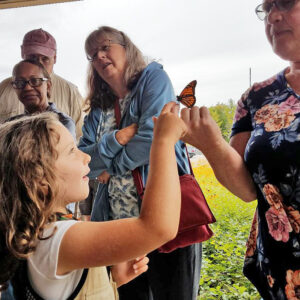By Coggin Heeringa, Program Director/Naturalist, Crossroads at Big Creek
Monarch Tagging, a Crossroads’ tradition, is scheduled for Saturday, September 4, at 1:00 p.m. thanks to collaboration between Crossroads at Big Creek and Wild Ones of the Door Peninsula. This free program is open to and will interest learners of all ages.
Naturalist Karen Newbern will present a lecture on monarch butterflies and give instructions on tagging migrating butterflies. Then, we will hand out butterfly nets and encourage participants to go out into the Collins Learning Center Butterfly Garden and the Wild Ones Meadow to capture these orange and black insects, which we will tag and record. It’s fun, educational and free. And this year, Wild Ones members will be handing out free New England aster plants (one per family while they last), as a way to help monarchs.
This activity is possible because Crossroads is a re-fueling stop for migrating butterflies as well as migrating birds and bats. It is also a refueling stop for plug-in electric vehicles.
Crossroads offers free electric vehicle (EV) car charges to the community. Our hope is that Tesla and other EV owners will enjoy our trails and recharge themselves as they recharge their vehicles. Many of our Door County visitors have expressed sincere gratitude for our car and soul refueling services, and some have even become Crossroads’ donors.
Things are improving for drivers as more and more charging stations are being installed across the country. Still, people with plug-in electric vehicles experience what is called “range anxiety”— the fear that their vehicle has insufficient range to reach a destination.
Migrating monarch butterflies, with brains the size of pinheads, probably do not have the mental capacity to experience “range anxiety,” or for that matter, gratitude, but they instinctively know that the flower-filled meadows and fields at Crossroads provide the fuel—nectar—they need to build up their lipid reserves.
Understand that the monarchs that emerge from their chrysalides in late summer are programmed to delay mating until next spring. The males are not looking for females and the females are not looking for milkweed on which to lay their eggs.
Instead, they are all looking for nectar-rich flowers on which to fuel up for their journey from here to a remote mountain forest in Central Mexico. There, they cluster in fir trees and spend the winter in a dormant state. Next spring, they will awaken about mid-March and immediately mate. Mated females will fly to northern Mexico or the Gulf states to lay their eggs.
That is a range of about 3,000 miles. Alas, monarchs will find precious few refueling spots as they glide over the heartland of America. They will pass over paved cities, suburbs with predominantly chemically treated lawns, and farmlands with genetically modified corn and soybeans growing right up to every roadside. Flowery fencerows and native plantings are few and far between.
It used to be that the monarchs weighed five times more when they arrived in Mexico than they did when they left their breeding areas. Because intensive agricultural practices in the Midwest have practically eliminated wildflowers, monarchs are lucky if they have enough stored fats to survive the winter.
In most parts of the Midwest, the best way to help monarchs is to plant milkweeds. But in Door County, milkweeds thrive and monarchs are breeding well, producing two, maybe three generations during the summer.
To truly help monarchs, we should wait a few weeks before mowing wildflowers like goldenrods and asters. Better yet, we should plant a variety of nectar-rich flowers which will bloom around Labor Day and into fall. Fall flowers such as the asters we will be giving away at our monarch-tagging event also help our wild and domestic bees prepare for the impending winter.
In the Great Lakes Region, the Door Peninsula is an integral refueling site for migrating monarch butterflies. We can extend their range and help them survive winter by providing fall flowers. In a very real way, the people of the Door Peninsula can help perpetuate the unique and threatened phenomenon of monarch migration.
Improving habitat biodiversity is one of the goals of Crossroads’ Habitat Helpers program. Our Tuesday evening work sessions are completed for the year, but Saturday mornings will continue with lots of fall restoration projects in the works. There will be no Habitat Healers on Saturday, Sept 4 (Labor Day Weekend), but it will resume on Saturday, September 11 from 9:30-11:30 a.m. We welcome volunteers at other times as well. For more information, see crossroadsatbigcreek.org.
Crossroads at Big Creek Learning Center and Nature Preserve is located at 2041 Michigan Street, Sturgeon Bay, Wisconsin. Crossroads is a 501(c)3 organization committed to offering education, conducting research and providing outdoor experiences to inspire environmental stewardship in learners of all ages. We welcome your support! Become a member of Crossroads by mailing your support to P.O. Box 608, Sturgeon Bay, WI 54235, or donate online at www.crossroadsatbigcreek.org
Thursday, September 2, 4:00 p.m. — Hike the Field Trail
Fields Trail always is interesting, but early September, it is at its most colorful. This 1.4-mile trail offers a floral kaleidoscope and expansive views. Some gentle hills. Free and open to the public.
Friday, September 3, 7:30 a.m. — Early Morning Bird Hike
Join the Naturalist for a morning of birding at The Cover Preserve. This time of year, we could see nothing or we might hit a great day for migration. Meet at the Kayak Landing at The Cove Preserve, 817 S. 20th Place, just off Utah Street. Binoculars are helpful and wear shoes that can get wet. Free and open to the public.
Saturday, September 4, 1:00 p.m. — Monarch Tagging
Participants will learn about monarch butterflies and then capture and tag them. Naturalist Karen Newbern will present a program and then participants take nets to capture monarchs. Monarch migration is weather-dependent, but we expect it to be underway over Labor Day Weekend. Free aster plants (one per family while supplies last). Free and open to the public.



 ALL CONTENT © 2024 BY DOOR GUIDE PUBLISHING
ALL CONTENT © 2024 BY DOOR GUIDE PUBLISHING




